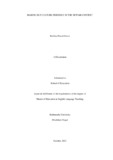
Please use this identifier to cite or link to this item:
https://hdl.handle.net/20.500.14301/212| Title: | MAKING ELT CULTURE-FRIENDLY IN THE NEWARI CONTEXT |
| Authors: | Suwal, Krishna Prasad |
| Citation: | Suwal, K.P.(2012).Making ELT culture-friendly in the Newari context |
| Issue Date: | Oct-2012 |
| School: | SOED |
| Department: | DOLE |
| Level: | Masters |
| Program: | Master of Education in ELT (2 years) |
| Abstract: | The traditional thought limits the skills of language teaching to reading, writing, listening and speaking, and linguistic aspect only. Of late, a new perspective has been added in this field. Culture is regarded as the fifth skill of language teaching (Phyak, 2010). Whenever we talk about language, there comes an issue of culture too because they are inseparable entities. But people may misunderstand whose culture is to be taught: culture of the target language or culture related to L1 (the source language)? This is a debatable issue as well as important one. When I interviewed the English-teaching Newar teachers and discussed with the Newar learners/students in a group, I found their views similar to that of mine. They expressed that it might be difficult to relate the teaching lessons with the L1 culture all the time but whenever it was possible, they did it, and it was very fruitful too. It was fruitful in the sense that teachers could easily make meanings of the lesson clear with reference to the L1 culture (Newari culture) and the students too were very encouraged to take part in discussions. The classrooms were lively and there were more interactions between the teacher and the students. This study was conducted in Bhaktapur among the local English-teaching Newar teachers and the local Newar students studying in the local schools of Bhaktapur. I collected the data using interviews and focus-group discussions. I belong to the Newar ethnic group. It is one of the ethnicities of Nepal which is very rich in culture, literature and history. That is why I became interested in writing on the issue of language teaching relating it with culture. |
| URI: | https://hdl.handle.net/20.500.14301/212 |
| Appears in Collections: | Dissertation |
Files in This Item:
| File | Description | Size | Format | |
|---|---|---|---|---|
| Thesis final-Krishna.pdf | 3.17 MB | Adobe PDF |  View/Open |
Items in DSpace are protected by copyright, with all rights reserved, unless otherwise indicated.